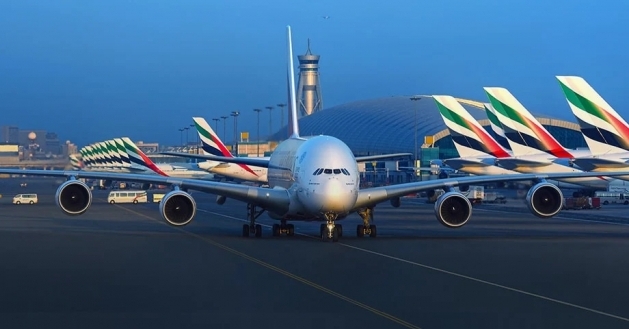Emirates Group H1 loss at $1.6 billion; cargo volume grows 39%
Revenue increased 81 percent to $6.7 billion and EBITDA was $1.5 billion compared to a negative $12 million. The group continued to maintain a healthy cash position of $5.1 billion as on September 30, 2021. ;

November 11, 2021: Easing of travel restrictions worldwide saw Emirates Group reduce its net loss to $1.6 billion for six months ended September 30, 2021, from $3.8 billion last year.
Revenue increased 81 percent to $6.7 billion and EBITDA was $1.5 billion compared to a negative $12 million.
The group continued to maintain a healthy cash position of $5.1 billion as of September 30, 2021, compared to $5.4 billion as on March 31, 2021.
"Across the Group, we saw operations and demand pick up as countries started to ease travel restrictions," said His Highness Sheikh Ahmed bin Saeed Al Maktoum, chairman and chief executive, Emirates Airline and Group. "This momentum accelerated over the summer and continues to grow steadily into the winter season and beyond.
“Our cargo transport and handling businesses continued to perform strongly, providing the bedrock upon which we were able to quickly reinstate passenger services. While there’s still some way to go before we restore our operations to pre-pandemic levels and return to profitability, we are well on the recovery path with healthy revenue and a solid cash balance at the end of our first half of 2021-22."
Emirates loss decline on higher revenue
Emirates reduced its loss to $1.6 billion in the first half of 2021-22 compared to last year’s loss of $3.4 billion while revenue was up 86 percent to $5.9 billion. The significant increase in operations saw Emirates report EBITDA of $1.4 billion in H12022 compared to $79 million for the same period last year.
Operating costs increased 22 percent against an overall capacity growth of 66 percent.
"Fuel costs more than doubled compared to the same period last year. This was primarily due to an 81 percent higher fuel uplift in line with substantially increased flight operations during the six-month period up to end of September, and also an increase in average oil prices," the statement said.
Emirates carried 6.1 million passengers during H12022, up 319 percent from the same period last year.
Cargo volume increased 39 percent to 1.1 million tonnes, "which brings the business back to 90 percent of pre-pandemic (2019) levels by volume handled. This shows Emirates Skycargo’s outstanding agility and ability to meet the requirements of its customers whether it be for the transport of vaccines and pharmaceuticals, essential goods like food and perishables, or champion horses and high performance cars."
Emirates Skycargo increased its pharma cool chain handling infrastructure by adding 94 cool room pallet positions to its existing infrastructure at Dubai airport. "Emirates Skycargo continues to support the global roll-out of Covid vaccines, having carried over 150 million doses through its Dubai hub by July 2021."
Emirates took delivery of two new A380s and retired two older aircraft during the first six months of 2021-22. In July, it launched services to Miami, a new destination. During the first half of 2021-22, Emirates activated codeshare and interline partnerships with Airlink, Aeromar, Azul, Cemair and South African Airways.
dnata revenue up on business pick-up
dnata’s revenue, including other operating income, increased 55 percent to $1 billion on increased business in cargo and ground handling, catering and retail, and travel services. Overall profit for dnata was $23 million compared to last year’s loss of $396 million.
dnata’s airport operations remain the largest contributor to revenue with $688 million, a 52 percent increase compared to the same period last year.
"Across its operations, the number of aircraft handled by dnata increased sharply by 116 percent to 222,668, and it handled 1.4 million tonnes of cargo, up nine percent."

